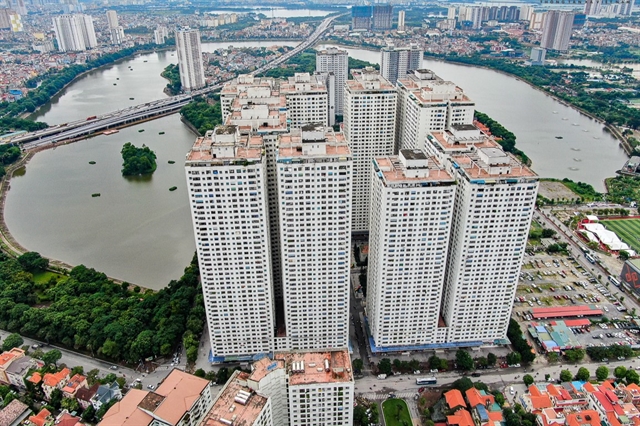 Business Beat
Business Beat

 |
| A densely built residential complex in Hoàng Mai District, Hà Nội. — VNA/VNS Photo |
Compiled by Hoàng Anh
HÀ NỘI — Three major new laws related to property ownership, recently approved by the National Assembly, are expected to bring about changes to the market, said business insiders and experts.
Insiders have praised the new laws' effects, which include the 2024 Land Law, the 2023 Real Estate Business Law and the 2023 Housing Law, in directing the market's structure and its business scale as new regulations aimed at creating a more favourable environment for property developers and their projects alike.
For instance, the new Land Law demands land funds for commercial housing projects acquired through auctions or biddings are only made available for large projects with adequate and synchronised technical and social infrastructure.
The new laws also allow the State to recover lands and put them up for bidding, which typically favours large developers with proven capabilities including financial, technical and experience qualifications. It will likely generate greater benefits to the public and local communities.
Industry experts said the new laws are also likely to prompt smaller players to merge or adapt to the industry's higher standards and enhance competitive ability, which, in turn, will improve product quality and service.
Older projects may need to adjust their direction, preferably towards providing social housing units or complying with the new regulations.
Some projects where investors have already accumulated land may need to shift their business direction, possibly transitioning to social housing or adjusting to comply with the new regulations.
Nguyễn Văn Đính, Vice President of the Vietnam Real Estate Association, said that the real estate market has grown rapidly in the last two decades. However, after a period of strong growth, signs of difficulty have emerged since 2018-2019 with one of the primary causes said to include institutional and legal obstacles. Đính said there were more than 1,200 projects across the country, valued at over US$30 billion, awaiting review and inspection.
He said the new laws aimed to unify institutional reforms related to land use, avoiding overlaps and conflicts between different laws, which will likely improve land utilisation and enhance the effectiveness of investment activities.
However, Đính said difficulties are part of the game, and more importantly they act as filters to eliminate businesses with inadequate capacity.
"Once the new laws fully take effect, the day of speculators and poor performers in the market will be numbered, leaving consumers with a handful of capable and reputable developers," he said.
This, according to him, is necessary as starting and implementing property projects will become more difficult and require large capital commitments compared to before.
Nguyễn Hoàng Nam, CEO of G-Home - a social housing developer based in the capital city of Hà Nội - said the 2023 Housing Law has removed several issues plaguing developers for years.
For example, the new law has allowed social housing developers to adjust prices for rental units based on the market. Previously, rental units located within social housing projects were severely handicapped because their prices were set higher than private rental units. To make matters worse, most potential clients were often scared off by the complex and lengthy legal hoops involved.
More importantly, Nam said was the Government's determination to speed up administrative reforms to shorten the time required to inspect and approve projects, which will likely result in significant savings in capital costs for developers.
He said the income requirements to purchase social housing units have finally started making sense. Under the new laws, unmarried individuals with an income lower than VNĐ15 million (US600) or a married couple with a total income not exceeding VNĐ30 million are qualified.
It had created a situation in which it was nearly impossible for buyers qualified for social housing to afford it because they didn't have the income while those with sufficient income were not qualified to make purchases.
"All these factors will give investors greater confidence in developing social housing. Along with many new circulars to guide the implementation of the new laws, I'm looking forward to seeing additional issues being resolved," Nam said.
Meanwhile, there have been calls from economists and policymakers for measures to keep property prices under control.
They said while the new laws were designed to limit speculation and stabilise the market in the long run, they may introduce pressure to increase prices in the short run.
A streamlined and transparent valuation method is a must to produce an accurate value of the lands. As stipulated in the 2024 Land Law, the old valuation has been shelved and replaced by prices issued annually by local authorities, a major step in keeping it close to market prices.
They said while large developers may find land compensation easier compared to previously, development costs will also increase, which will force developers to raise prices.
In the meantime, prices will likely remain high with possible modest gains in the short to medium run with analysts saying prices can rise as high as 20 per cent annually this year before stabilising. — VNS




